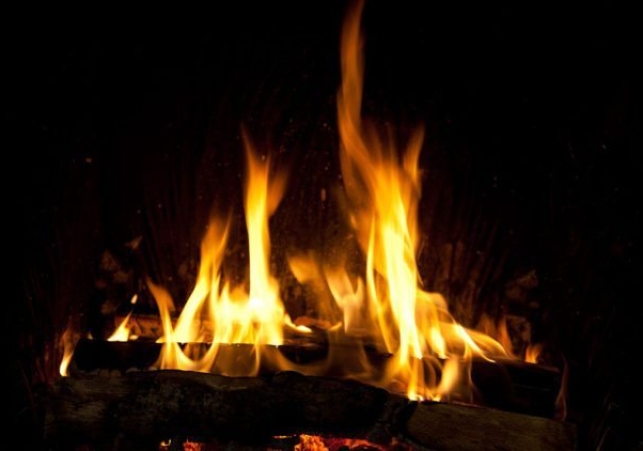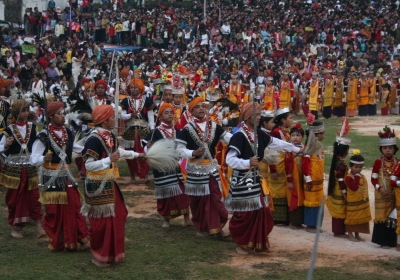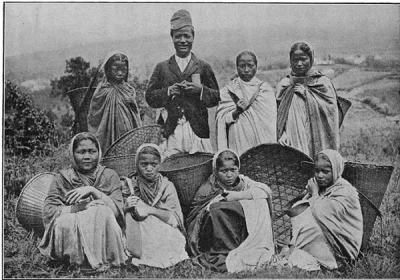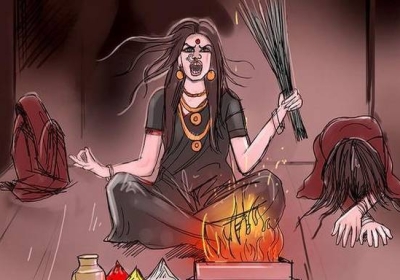THE HEARTH

The hearth is the foundation of family structure in Khasi matrilineal system. The base of the hearth is the earth surface where three hearthstones are erected, which represent the mother, the maternal uncle and the father. The father and maternal uncle on either side guarding the mother in the middle, while from the aerial view, which is considered divine, the hearthstones appeared the same and equidistant from each other. It signifies that in the temporal world, the females are to be defended by the males, while in the spiritual realm they are all the same, without any distinction of gender. Fire is one source of energy that ignited and burns in a fireplace to generate heat and warm the interior of the house, and facilitates the hearth to create warmth at home. The mother is the core of the family and both the father and maternal uncle are the primary factors for building a home. In Khasi they are known as 'Ïawbei' for the mother, 'Thawlang' for the father, and 'Suitnia' for the maternal uncle. For the reproduction purpose it is the sacred duty of the mother as a wife and her husband, the father and for the counselling purpose it is the mother as a sister and her brother, the maternal uncle. For providing the essential needs of the mother and her children, it is the responsibility of the respective father; for providing the material and spiritual resources to the family of his mother and his siblings or his sisters and their children, it is the burden of the eldest maternal uncle and his brothers. To further elaborate on this, every husband is held responsible to provide basic necessity of provision for food and cloths of his wife and children, while it is customary that the paternal mother would be gifted a baby carrying strap or 'Jaiñit' as a gesture of blessing to the children of her son during infancy. Every maternal uncle along with his brothers are liable to take care of the household affairs of their mother, shelters for their married sisters and the wellbeing of their nephews and nieces within the clan cluster. Every mother is responsible to feed and nourish their children for their physical, mental and emotional wellbeing, while counselling and protection is the task of every elderly maternal uncle to the younger members in the maternal family, including the father to their respective children. Therefore, the ideal Khasi home comprise of the three hearthstones in the care of the mother, the father and the maternal uncle. The usual practice is that the father would visit his wife and children every evening after work and stay the night only to return to his maternal home at dawn. In the maternal family cluster all the married males went to the house of their respective wives and children and stay for the night, while the bachelors remained at their maternal home.
Another practice that is prevalent in the past is that every grand uncle would visit his nephews and nieces for storytelling around the hearth. Usually, they would narrate the tales in accompaniment of music from the stringed instrument or a flute till late night. This is how the oral myths, legends, folk tales and parables were passed3 c through generations. The narration is for imparting knowledge through musical amusement and enchantment. The fireplace is the only place they would gather around after dinner for the melodious folklore. Every married man is engaged in the family occupation for earning livelihood and for contribution to the maternal family resources. In the process, the ancestral properties are in the custody of the mother or on her demise, the youngest daughter, while the eldest among brothers or any matured brother in lieu of him, is usually a supreme head of the family council. It is to be understood that the youngest daughter ,the khatduh can be appointed as one if the actual youngest daughter is either not capable or has chosen to live away because of marital any other personal reasons.(is not the least in chronology, but the least available daughter for the care and service to her old parents, uncles and any other members of the maternal family.)
The matrilineal system is inclusive of everybody in the maternal fold and nobody will be deserted or isolated from the family, and in this manner there were no beggars in Khasi society and hardly even today. Every father of a family is the maternal uncle to his maternal family and his clan and hence does not have any role in the family of his wife, except to provide the necessities, affection and occasional guidance and counselling to his children and respect and faithfulness to his wife. Every married man is a visiting husband at his wife's home and an earning father for his children and the rest of the things in the maternal home lies with the mother and her brothers or the grandmother and her sons. For all the domestic necessities, the mother would cater and provide, while all the other needs beyond the boundary of domestic domain, it is the responsibility of the maternal uncles and adult nephews.
The youngest daughter (meaning the least available daughter for the care and service of the maternal family members??) shall inherit the status of her mother after her demise. She is bound to take custody of the domestic affairs in consultation with her brothers in a family council. The mainstay of the family centres around the hearth of the maternal home. It is around the hearth that infants are nourished; around the hearth the children are listening to the lores of their grand uncle; around the hearth the family council is held; around the hearth the solution to the problems is solved; around the hearth the ailments is healed; around the hearth the rituals and ceremonies are performed; around the hearth the corpse of the departed soul is kept for three days; around the hearth the temporal and the spiritual communicated; around the hearth that love and compassion for mankind is nurtured and provided. In the modern Khasi society there are overwhelming influence of the western patriarchal culture that the role of the maternal uncle is deprived and deliberately ignored, which has reduced to the exclusive family of the two parents, which mean that two hearthstones can longer remain the traditional foundation to sustain the nourishment and warmth at home.







